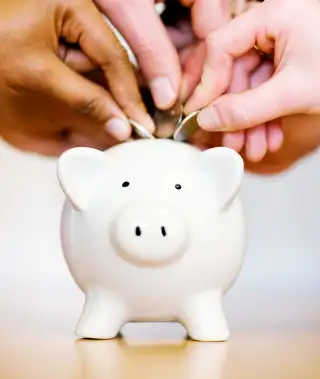What It Says About the Economy that People Are Saving their Tax Refunds

This spring, Jes Norman is looking forward to handing her personal financial advisor a bigger-than-normal check: her tax refund.
“I’m investing because I hadn’t in prior years,” says Norman, 28, a project manager for an electronic medical record company. “My tax return is the easiest deposit to give since it’s ‘bonus’ money.”
After a serious medical illness plunged her in debt four years ago, the Rockford, Ill. resident was forced to spend her available cash paying off medical bills. Now her finances are stable enough for her to save her refund.
Retailers looking forward to tax refund season hope Americans with extra cash might be quick to throw open wallets and splurge. But surveys show a higher percentage of adults will be making like Norman this year, and socking away at least part of their refunds.
Fewer Plan to Splurge
The average tax refund is up 0.7% this year, to $2,893. And the National Retail Federation’s survey last month of over 6,000 adults across income brackets and regions showed almost half of consumers expecting a refund are planning to save some of what they get back from Uncle Sam.
That is the highest percentage since the trade association started conducting the survey 12 years ago.
Thirty-nine percent of consumers also planned to pay down debt with their refund.
Only 10% planned to make a “splurge” purchase and a quarter said they would use at least some of the refund for living expenses.
A smaller survey by Bankrate.com showed consumers who planned to spend their refund dropped from 7% in 2010 to only 3% this spring. Meanwhile those who planned to save or pay down debt grew from 58% five years ago to 67% today.
Blame the Recession Hangover
This savings trend has been taking off on a national scale since the recession, says Mark Zandi, chief economist for Moody’s Analytics. Before the recession, the savings rate hovered between 2.5 and 3%. Now it's up to 5.5% and has been on the increase for the last three months.
“American consumers remain cautious,” Zandi said. “I think, in general, consumers are not letting loose.”
Other economic indicators seem to back this up.
Despite strong job growth, several months of increases in personal income and lower gas prices, retail sales dropped 0.6% last month—despite forecasts for an increase of 0.3%. This is the first time since 2012 they have dropped for three consecutive months.
Personal consumption also declined more than expected: -0.2% and -0.3% over the past two months before adjustments for inflation.
And the annualized pace of auto sales fell in February to 16.2 million from January’s 16.6.
Meanwhile consumer sentiment has been slipping during tax season. The index peaked at an 11- year high in January at 98.1 but fell in February to 95.4 and to 91.2 in March’s preliminary forecast.
New York tax professional Alisa Martin, who has clients ranging from low-income freelancers to high-income professionals, also says she has seen a new awareness from clients to save and pay down debt since the recession.
“People are more concerned about savings,” said Martin. “Even people that were good financially before the crash, it dipped into a lot of their savings. They saw accounts really go down. Now they’re trying to get things built back up.”
The NRF survey found that Millennials were even more likely than the general population to save (55% vs. 47%)—which may be owed to their having come of age in tough economic times.
“Perhaps having learned a few financial lessons from their parents during the economic downturn, it appears that Millennials are looking for ways to get ahead,” explains Pam Goodfellow, a director for Prosper Insights and Analytics, the company that administered the poll. “Less likely to be saddled with mortgages and accumulated debt, tax refunds represent the perfect opportunity for younger consumers to invest in their future.”
https://img.money.com/2015/04/ross_tax_refund_audio1.mp3Hear why Millennials are saving more of their refunds
Aside from these national trends, Americans may also be affected by more programs promoting savings this tax season. H&R Block, one of the country’s largest tax preparers, announced a new 3-year program to promote savings called “Savings at Tax Time.” The campaign, a partnership with the Consumer Financial Protection Bureau, will encourage clients to save when they come in to get their taxes done.
The bureau also runs a similar campaign at thousands of government-supported community tax preparation sites for low-income Americans.
Retailers Will Lose... But Maybe Not as Much as Expected
The loss in potential spending by Americans is significant. Last year, the IRS handed Americans a total of nearly $65 billion dollars in refund checks.
But even with the increased push toward savings, tax refund season won’t be a total bust for retailers.
“We do know that there are significant spending responses among households when their tax refunds arrive,” said Jonathan Parker, a finance professor at MIT who has studied how Americans tend to spend money they get from government rebates and refunds.
Parker said many studies have shown that people tend to spend a “significant share” of these types of payments—even those who say they’ll save it.
More on taxes from Money 101:
How can I reduce my tax bill?
How do you know if it makes sense to itemize?
What if I need more time to file my taxes?